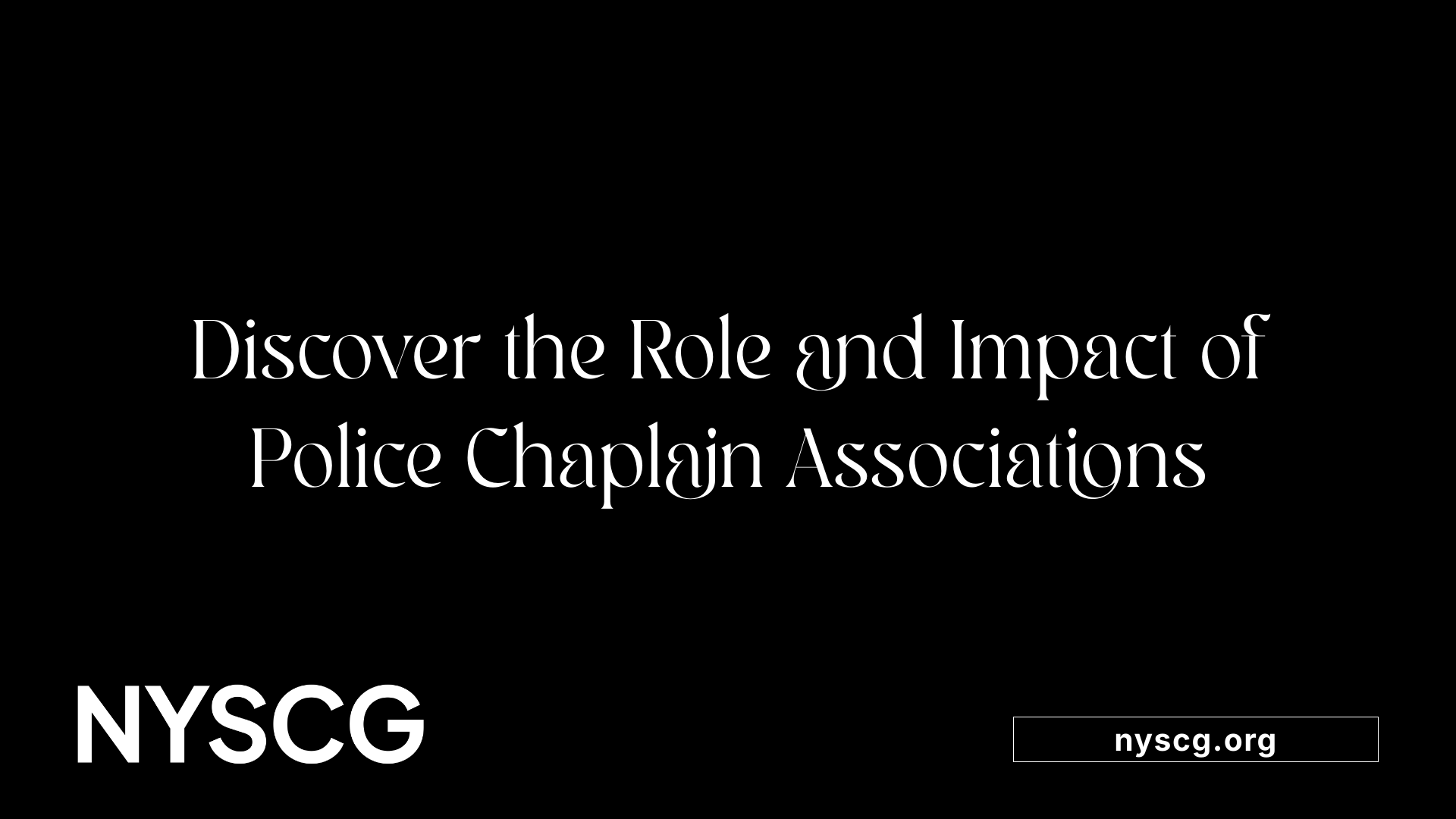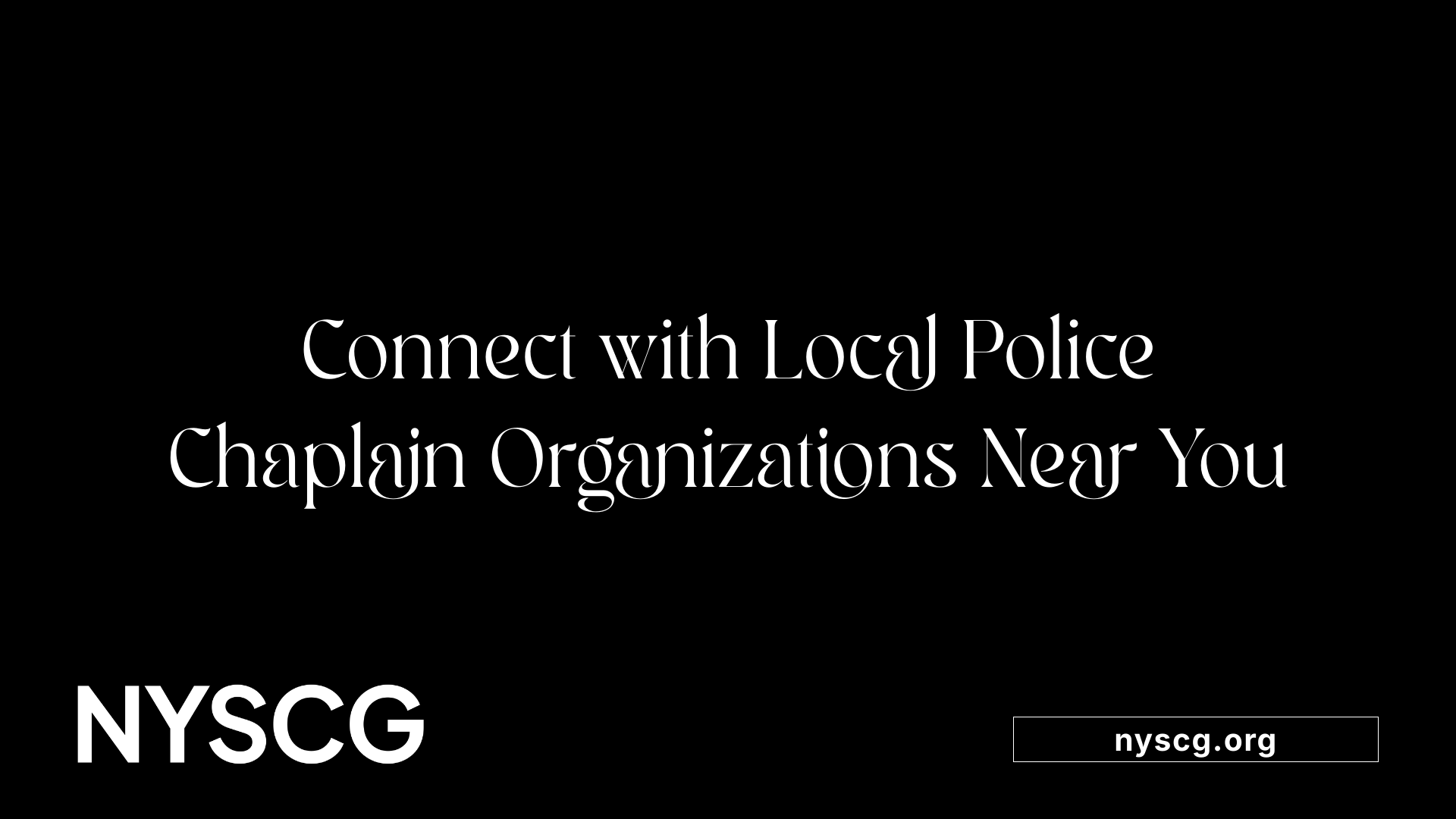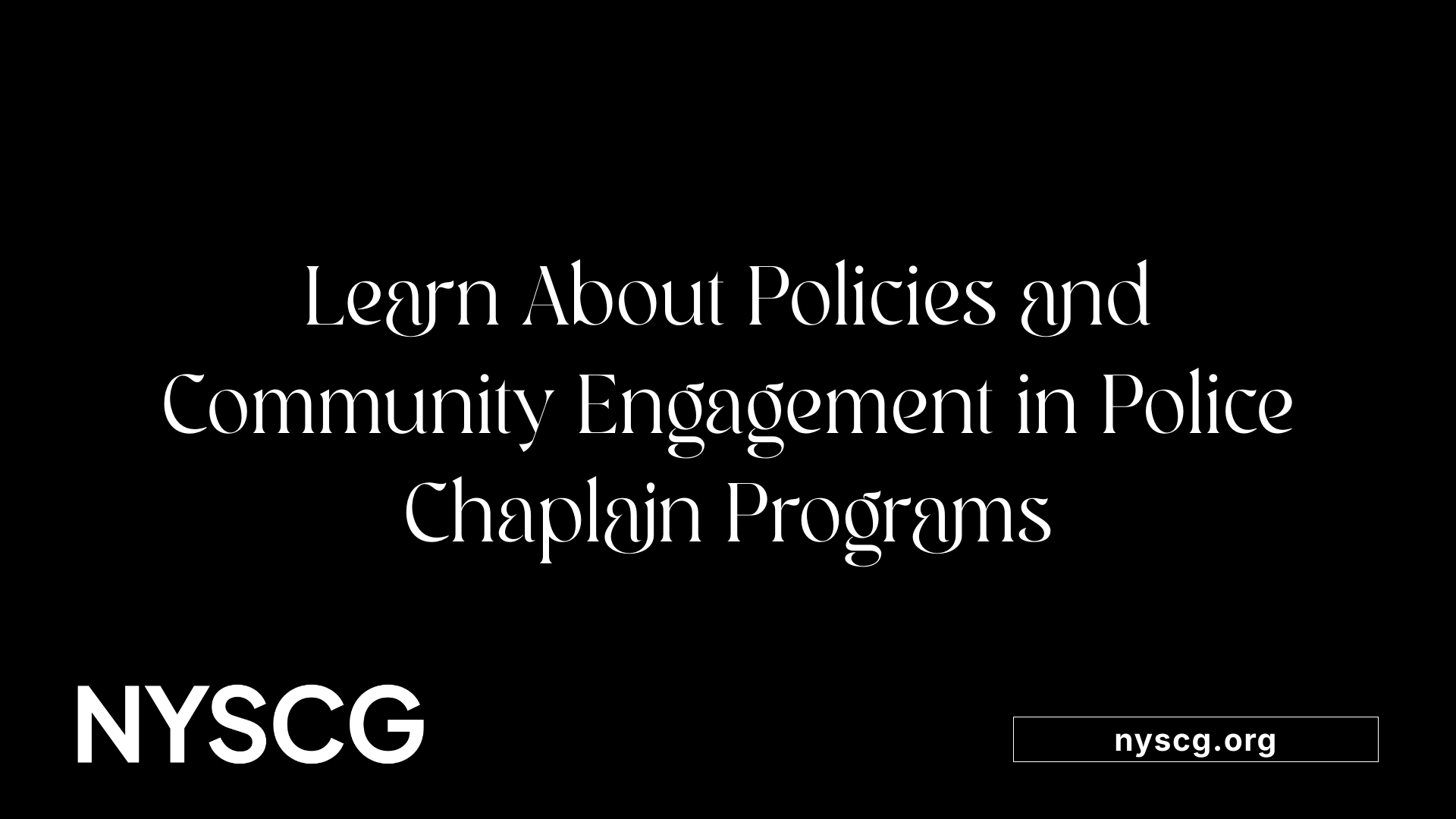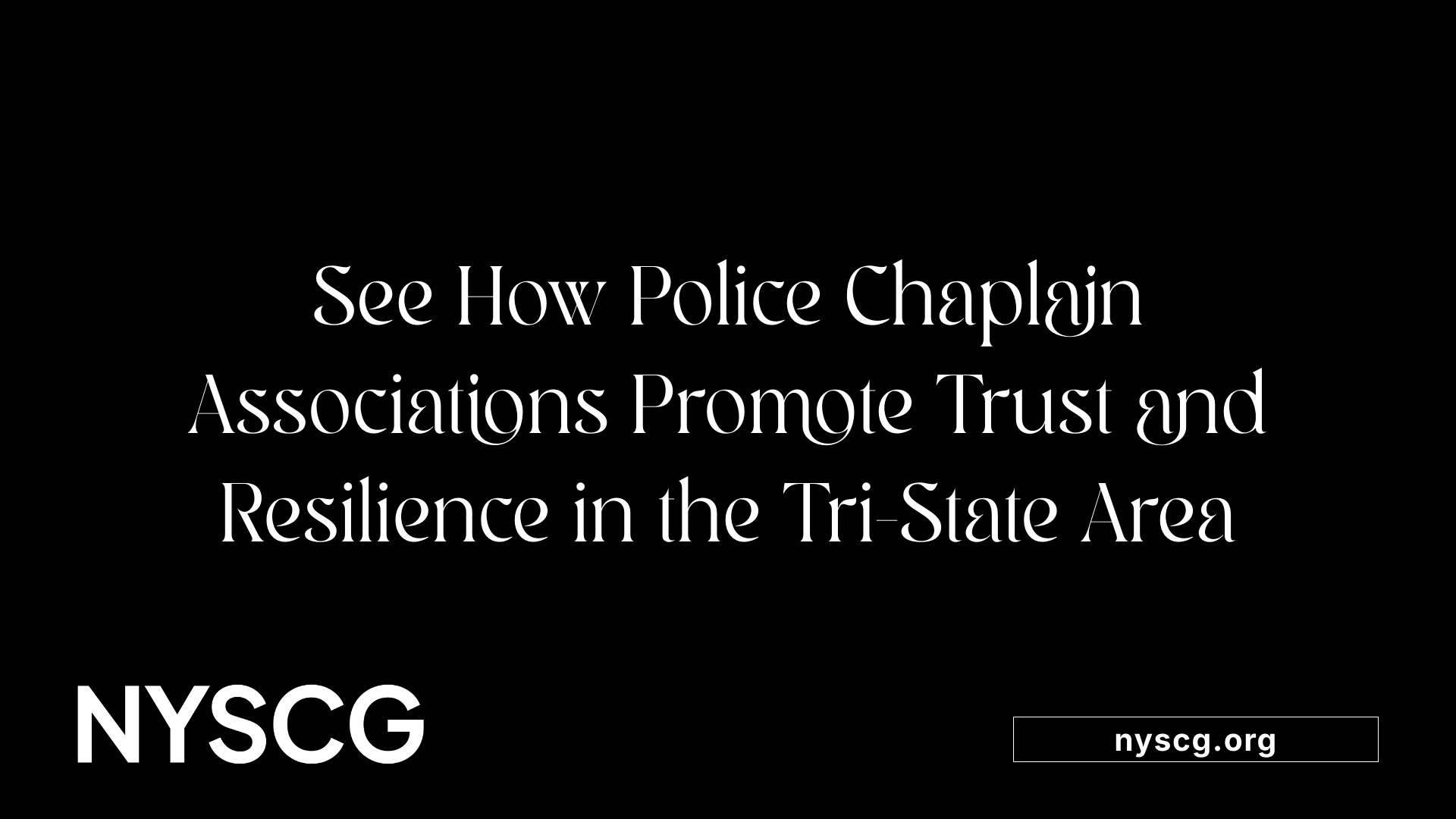Police Chaplain Associations Near Me (Tri-State Focus)


In the complex landscape of law enforcement, police chaplain associations serve as vital links between officers, communities, and faith-based support systems. These organizations are instrumental in providing spiritual care, crisis intervention, and fostering community trust. This article explores the functions, programs, and resources of police chaplain associations near the Tri-State area, highlighting their contributions to law enforcement and community well-being.
 Police chaplain associations and organizations form essential networks that support and enhance the efforts of chaplains serving law enforcement agencies. These groups provide critical resources, ongoing training, and a platform for chaplains to share their experiences, address challenges, and develop best practices.
Police chaplain associations and organizations form essential networks that support and enhance the efforts of chaplains serving law enforcement agencies. These groups provide critical resources, ongoing training, and a platform for chaplains to share their experiences, address challenges, and develop best practices.
One of the main purposes of these organizations is to promote the effective operation of police chaplain programs. This includes ensuring chaplains can deliver support to officers, victims, and families during moments of crisis, trauma, or loss. They also foster community engagement through various initiatives, such as youth outreach, mental health support, and public education.
Organizations like the Association of Law Enforcement Chaplains (ALEC) lead nationwide efforts by offering professional training. ALEC provides annual classroom sessions, regional workshops, and is working toward online training options, making education more accessible for chaplains across the country.
Membership and participation in such networks help chaplains stay current on best practices and obtain continuing education credits. These supports ultimately enhance their ability to serve effectively, build trust within their communities, and promote positive relationships between law enforcement and the public.
Overall, police chaplain associations serve as vital support systems that empower chaplains to offer compassionate, professional, and culturally sensitive assistance, enriching community safety efforts.
 Becoming a police chaplain involves specialized training and meeting specific membership requirements. Organizations like the International First Officer Chaplains (I.F.O.C.) offer accredited courses—typically 40 hours long—that can be completed either online or in person. These courses cover crucial topics such as critical incident stress management, trauma response, and spiritual care, preparing individuals for the demands of chaplaincy work.
Becoming a police chaplain involves specialized training and meeting specific membership requirements. Organizations like the International First Officer Chaplains (I.F.O.C.) offer accredited courses—typically 40 hours long—that can be completed either online or in person. These courses cover crucial topics such as critical incident stress management, trauma response, and spiritual care, preparing individuals for the demands of chaplaincy work.
In addition to training, prospective chaplains can pursue certification through various pathways. The Law Enforcement Chaplain Training Program, led by experienced former officers, is free to attend and suitable for both active and retired law enforcement personnel. This program provides a certificate of completion but does not automatically certify someone as a police chaplain.
Official certification is often granted by professional organizations like the Association of Law Enforcement Chaplains (ALEC). ALEC offers certification at both basic and advanced levels, which require coursework, Continuing Education Units (CEUs), and membership participation. This ensures chaplains stay updated with best practices and maintain a high standard of service.
Membership criteria generally include theological training from accredited institutions, ordination or recognition by a church body, good standing within a recognized denomination, and approval by police or screening committees. The application process typically involves background checks, interviews, and approval by police leadership.
Beyond initial training and certification, ongoing education plays a vital role. Many organizations host conferences, workshops, and instructor certification programs, all aimed at enhancing chaplains' skills and knowledge. The availability of online courses continues to grow, making continuous learning more accessible.
| Training Programs | Duration | Focus Areas | Certification Offered |
|---|---|---|---|
| I.F.O.C. Training | 40 hours | Trauma, spiritual care, incident stress | Yes (Chaplain, Advanced, Specialty) |
| Law Enforcement Chaplain Training | Free | Trauma, practical ministry | Certificate of completion |
| ALEC Certification | Varies | Leadership, crisis intervention | Basic & Advanced |
| Ongoing Education | Variable | Continued skill development | CEUs, instructor courses |
For those interested in becoming a police chaplain, training opportunities are abundant through reputable programs and organizations, supported by ongoing education to ensure effective service in law enforcement communities.
 If you're looking to connect with police chaplain organizations in your area, resources like online directories and official websites are invaluable. Many law enforcement agencies maintain dedicated pages for their chaplain programs, providing contact details, volunteer information, and ways to get involved or request support.
If you're looking to connect with police chaplain organizations in your area, resources like online directories and official websites are invaluable. Many law enforcement agencies maintain dedicated pages for their chaplain programs, providing contact details, volunteer information, and ways to get involved or request support.
For example, the Spokane Police Chaplaincy offers a direct point of contact through Senior Chaplain Mickey Tuter. You can reach him via email at spdchaplain@spokanecity.org for assistance or inquiries.
On a national level, organizations like ChaplainUSA serve as an umbrella body for chaplain programs across the country. Their contact information includes a mailing address at 600 Fisk Ave. Suite 125, Brownwood, TX 76801, a phone number (888-699-5367), and email (admin@chaplainusa.org). They also provide guidance on volunteer opportunities and training resources.
Becoming a police chaplain involves a formal process that emphasizes credentials and approval. Typically, candidates must pass background checks and obtain approval from the police chief and a screening committee. They need to demonstrate that they are ordained or recognized clergy, preferably with formal theological training or extensive pastoral care experience.
Once approved, chaplains are usually required to participate in departmental training, ensuring they understand confidentiality policies and their respective roles. They work under police supervision and respond to calls for crisis support, death notifications, or traumatic incidents, always maintaining a professional and compassionate approach.
| Organization Name | Contact Method | Additional Details |
|---|---|---|
| Spokane Police Chaplaincy | Email: spdchaplain@spokanecity.org | Based in Spokane, offering direct contact with senior chaplain |
| ChaplainUSA | Phone: 888-699-5367 | National organization providing contact and training info |
For those seeking a chaplain near them, searching using phrases like "Police Chaplain Contact Information Near Me" can lead to local listings and department resources tailored to your area.

Police chaplain programs are guided by comprehensive policies designed to ensure professionalism, effectiveness, and neutrality. These policies set standards for recruiting credentialed religious leaders or recognized clergy who are in good standing with their faith communities. Every chaplain must undergo background checks, meet training requirements, and receive approval from police leadership before serving.
Operational procedures define the roles of chaplains, including providing emotional support, crisis intervention, and faith-based counseling during critical incidents. They participate in community and departmental events, offering spiritual care while respecting the separation of church and state. Confidentiality is a core principle—chaplains maintain privileged communication unless safety concerns or legal obligations arise.
These guidelines promote inclusivity and impartiality, ensuring chaplains serve all individuals equitably and effectively across diverse communities. The appointment process involves a thorough review to ensure candidates are suitable and prepared to support law enforcement and the public in sensitive situations.
Organizations such as the First Responder Chaplain Association (FRCA) actively engage with their communities by developing initiatives that foster trust and collaboration between law enforcement and residents. They provide ongoing training, educational resources, and crisis support services like hotlines and counseling. These efforts help law enforcement officers better understand community needs and improve relations.
Chaplain associations often partner with local faith groups, social services, and community organizations to create programs on trauma response, mental health, and social cohesion. They organize workshops, forums, and outreach events that promote transparency and community involvement. Such collaborations contribute to more cohesive policing, improved public trust, and a shared approach to addressing social challenges.
| Organization | Focus Area | Community Impact |
|---|---|---|
| First Responder Chaplain Assoc. | Emotional and crisis support in Kansas | Enhances resilience of first responders and helps community healing |
| Kansas City Police Chaplains | On-call spiritual care for police | Builds trust through immediate crisis response and pastoral support |
| Association of Law Enforcement Chaplains | Training and best practices | Standardizes quality care across regions, supports community outreach |
These partnerships and programs highlight how chaplain associations serve as vital bridges between law enforcement and the communities they serve, fostering trust, healing, and mutual understanding.

Police chaplain associations like the Kansas City, Kansas Police Chaplains Association play a vital role in strengthening community relationships. By providing emotional support during critical incidents and death notifications, chaplains help foster an environment of understanding and trust. Their presence at official events and their availability for private consultations contribute to a more compassionate law enforcement culture.
Chaplains serve as a vital resource for police officers, offering crisis intervention, spiritual care, and a non-judgmental ear during times of stress. The Association of Law Enforcement Chaplains (ALEC) supplies ongoing training that helps chaplains stay prepared for various situations. This support mechanism boosts morale and resilience among officers, ensuring they have resources to manage the emotional toll of their duties.
A key aspect of these associations is promoting an inclusive approach that respects various faith backgrounds. Members often come from diverse religious traditions, facilitating partnerships with different community groups. This collaboration enhances community outreach efforts and ensures that law enforcement agencies can serve all residents more effectively.
| Organization | Focus Areas | Training & Support | Community Engagement |
|---|---|---|---|
| FRCA | Emotional support, death notifications, crisis counseling | Ongoing education, peer encouragement | Supports first responders and families |
| KC Police Chaplains | Pastoral care, on-call support, death notifications | Requires theological training, police approval | Focused on Wyandotte County |
| ALEC | Professional training for chaplains | Workshops, online courses, CEU transfer | National outreach for law enforcement |
These associations exemplify the collaborative effort to enhance safety, resilience, and inclusivity in the tri-state region, ultimately contributing to a stronger, more trusted community.
Police chaplain associations in the Tri-State area play a crucial role in bridging the gap between law enforcement and the communities they serve. Through specialized training, dedicated support services, and active community engagement, these organizations enhance the ability of police to respond compassionately and effectively during crises. Their work fosters trust, promotes mental and emotional well-being, and strengthens community resilience. As law enforcement continues to evolve, police chaplain programs will remain vital to safeguarding mental health, supporting victims, and nurturing positive police-community relations for years to come.
All you need is the will to make the world a better place.
New York State chaplain group inc. is a tax deductible organization with a federal tax Id number 92-383-4921